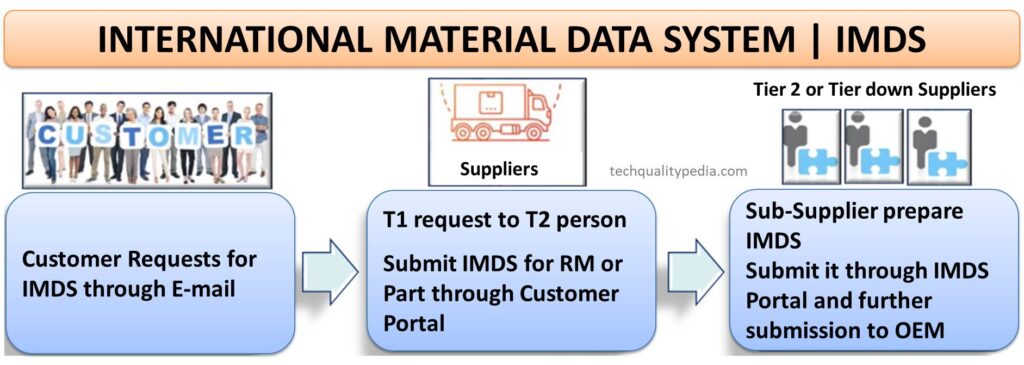Table of Contents
What is IMDS?
The International Material Data System (IMDS) is a global online database used by the automotive industry to manage and exchange information on materials and substances used in manufacturing vehicles. IMDS was developed in the year 1999 by DXC technologies.
Why need for IMDS?
Using IMDS, it is possible to meet the obligations placed on automobile manufacturers, and thus on their suppliers, by national and international standards, laws, and regulations. (ELV, REACH, RoHS, etc.)
Who is Part of IMDS?
The major OEMs include BMW, Daimler, Ford, Opel, Porsche, VW, Volvo, Nissan, Toyota, Audi, and SUZUKI are part of IMDS (International Material Data System)
How is IMDS helping the automobile industry?
- It helps in achieving Substance Level Analysis. Substance of Concern (SOC) Compliance.
- It helps in controlling hazardous substances present in the Raw Material and Part or Component.
IMDS Process Flow
- Customer Requests for IMDS through E-mail.
- After getting IMDS requests from the customer, submit IMDS for Raw Material or Part through the customer portal.

Important Points for IMDS Submission
The important points to remember for IMDS submission are:
- A supplier must Submit IMDS as per the Customer’s Request.
- IMDS must be submitted through the Portal.
- IMDS must be taken through a portal from your suppliers.
IMDS Key Features
Material Transparency
IMDS tracks or monitors the composition of Raw Materials and Parts to ensure compliance with environmental regulations, such as RoHS, REACH, Asbestos, and ELV directives.
Collaboration
Manufacturers and suppliers use the International Material Data System (IMDS) to share data securely across the supply chain.
Compliance
Helps in verifying that materials meet safety and environmental standards, avoiding the use of restricted or hazardous substances. (SOC Compliance)
Sustainability
Promotes sustainable manufacturing by providing information about material recyclability and environmental impact. International Material Data System simplifies regulatory compliance and promotes responsible material management in the automotive industry.
You will also like
Persistent Organic Pollutants(POPs) & Phthalates
